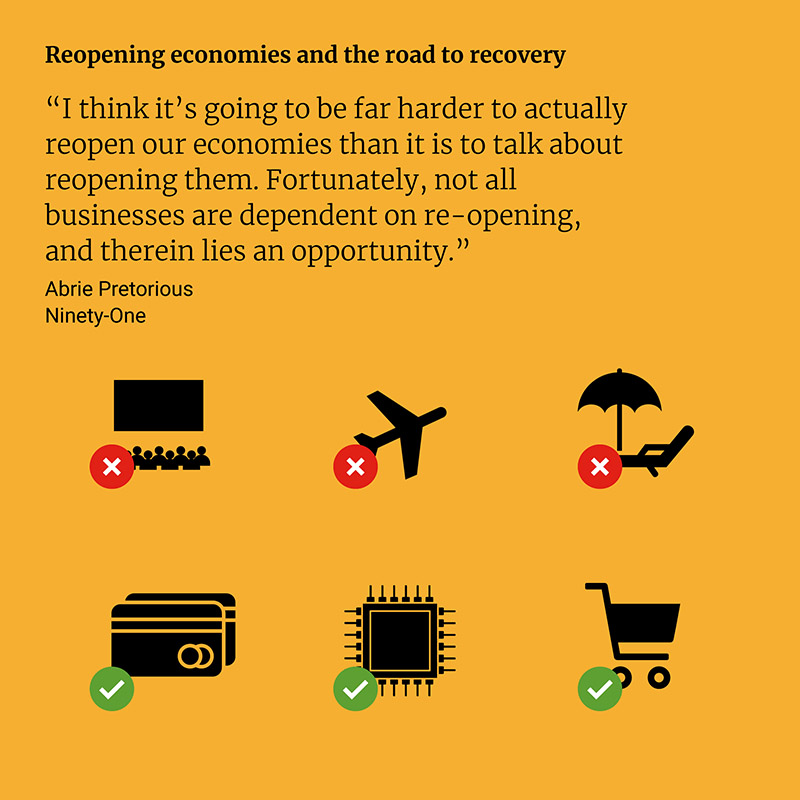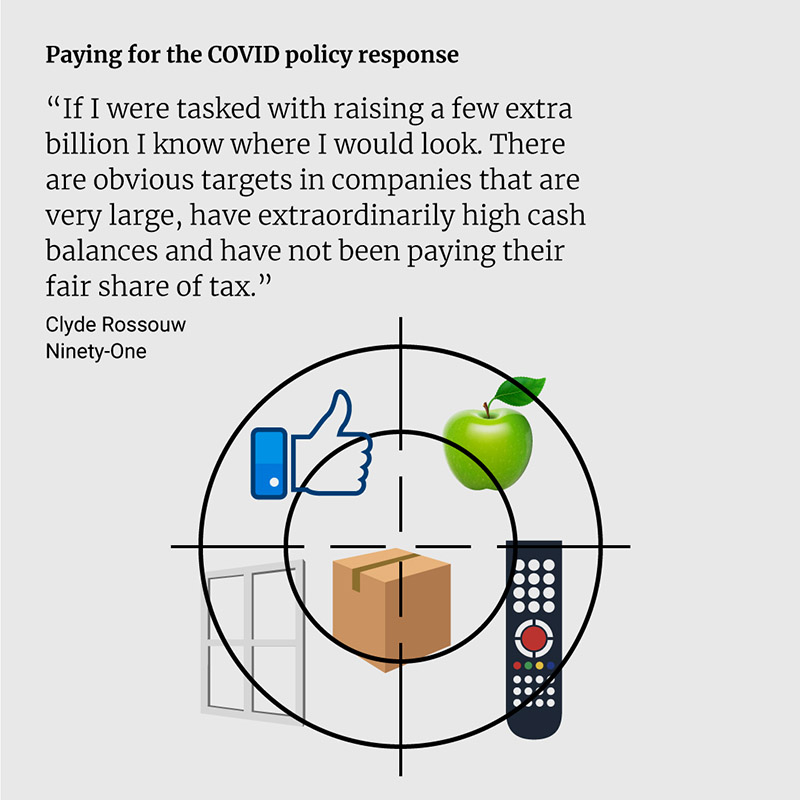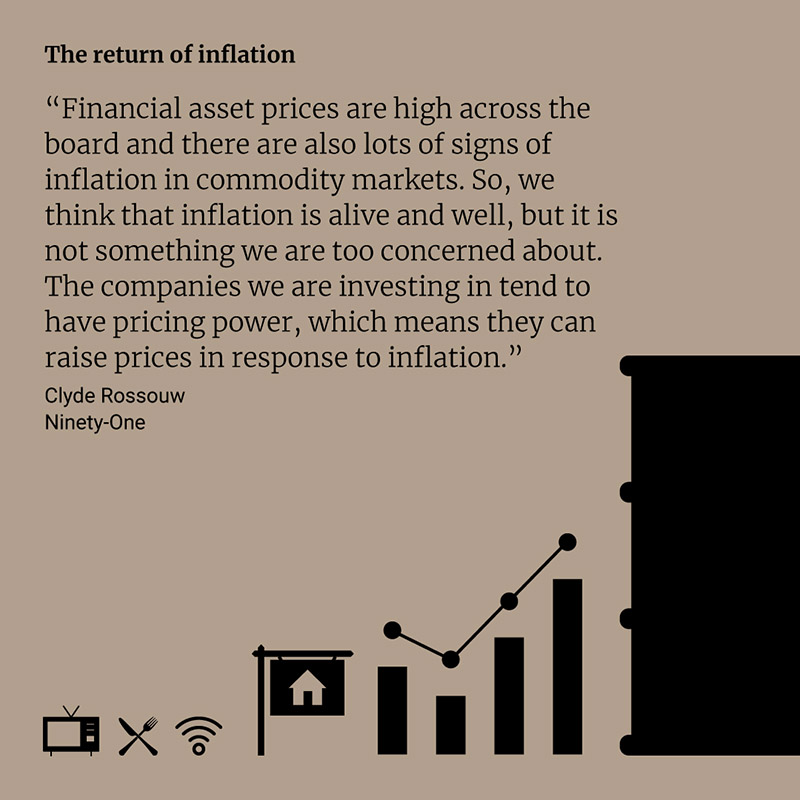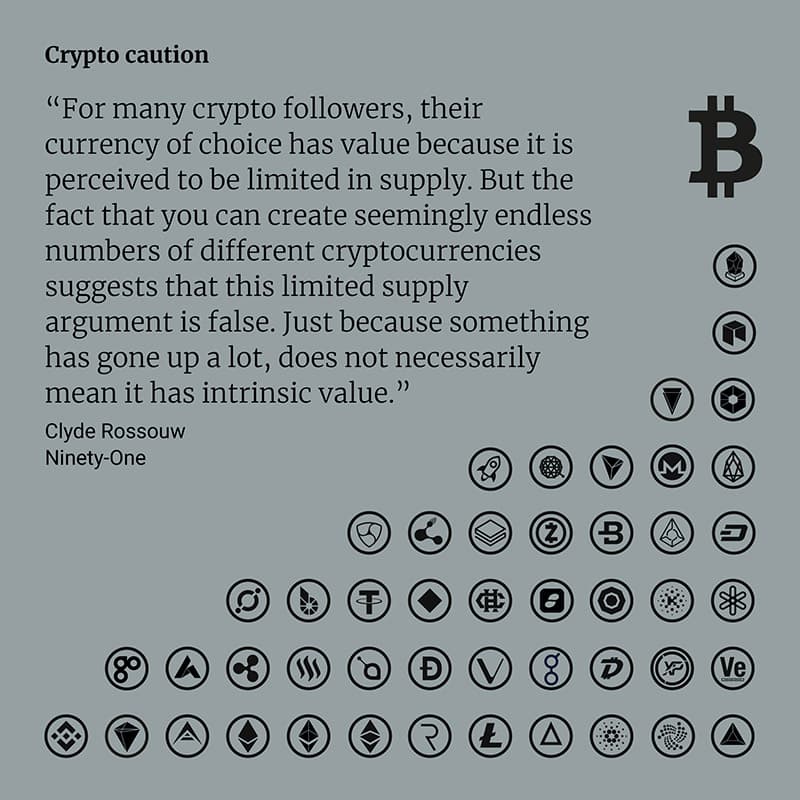- News
- Investing
Ninety-One’s Clyde Rossouw and Abrie Pretorius, managers of the St. James’s Place Worldwide Income Fund and co-managers of the St. James’s Place Global Quality Fund, discuss the risks and opportunities available across the current global investment landscape.

Following an extremely challenging year, how do you view the market outlook for 2021 and beyond?
Clyde Rossouw: I would start by highlighting the growing disconnect between where markets have got to and where we are economically. Stock markets appear to be looking ahead to the next cycle and trying to anticipate what the post-COVID world will look like. Many regional economies, however, are still struggling to find the road to recovery. This is something we need to be aware of as investors and it lends itself to a degree of caution in our view of the near future.
We are optimistic that the economic normalisation process will continue from here, with a lot of activities returning to something that resembles what we were used to prior to 2020. But, broadly speaking, global stock markets are already back at rather extended levels. Central banks continue to keep the liquidity taps wide open, and free money is still very much around. However, I feel a little bit more nervous now than I did this time last year. Twelve months ago, the environment was tough, but asset prices were low. Now, the environment is still tough, but asset prices are high. It therefore seems sensible to approach markets with a bit more caution.
Are there any attractive opportunities left in stock markets?
Abrie Pretorius: Yes, there are pockets of opportunity, but it is as important as ever to be selective. I believe the portfolios are strategically advantaged and very appropriate for this environment, but they are currently trading at one of the biggest discounts to the market that I’ve seen in almost fourteen years of running this strategy. Given the attractive financial characteristics that we are looking to invest in, and the robust performance that we expect these businesses to deliver, our portfolios would usually warrant a valuation premium to the market. This makes us quite excited about the outlook right now.
Across the market more broadly, there are clear risks in terms of valuation and the pace at which economies are now expected to reopen. I think it’s going to be far harder to actually reopen our economies than it is to talk about reopening them. Fortunately, not all businesses are dependent on re-opening, and therein lies an opportunity.

Did the volatility of 2020 lead to more portfolio activity?
Clyde: It’s fair to say we’ve probably seen a full market cycle over the last twelve months, which is unusual because normally such a cycle would take five-to-seven years to complete, sometimes more. We came into the crisis with a fair amount of cash within portfolios and we’ve gradually put this to work, taking advantage of fantastic opportunities that we felt we could not ignore. Overall, however, there was already a sensible balance within portfolios, which has meant that we haven’t needed to make wholesale changes to reposition the portfolios to remain relevant in the COVID and post-COVID world. The portfolios were already in good shape for this environment.
How do you explain the continued outperformance of US technology stocks, such as the so-called FAANGs?
Clyde: I think this is linked to the increasing influence of passive investment strategies [which aim replicate the holdings and performance characteristics of an entire stock market index, rather than actively taking selective positions in particular companies]. There is no doubt in my mind that the combination of free money and a growing desire among consumers to pay less for a commoditised financial product, has driven strong growth in passive investing relative to active management. There are a lot of arguments in favour of passive investing, but I would argue that the growth of these strategies ultimately makes the opportunities for active managers even larger.
The growing influence of passive means that a lot of shares trade without recognition of price seeking behaviour. In other words, who is actually deciding that a company like Facebook is worth $300 per share? That collective decision is not always completely driven by an argument about the intrinsic value of a company. The biggest problem with passive strategies is that they buy assets simply because they have money to invest. To our minds, that is not always the most intelligent way to invest. By definition, the growth of passive investment has meant momentum investing has become quite fashionable.
Part of our value proposition is to invest in businesses that may not be quite so obvious or well-known to the world. Philosophically, we believe that is much more likely that we will unearth long-term investment successes that way, rather than investing in businesses that are already well-known and popular. It goes without saying that Google is a fantastic business, as is Facebook and several of these other successful listed technology businesses. These companies are already well-known to most people and engagement with their products and services is extremely high – we interact with them daily. However, our biggest concern with these stocks is their narrow leadership of the market, which is typically associated with elevated prices and bubble-like characteristics in the marketplace.
Meanwhile, one of the biggest current risks that we think investors must think very carefully about is the role that regulation may play in changing profit and valuation dynamics going forward. This goes hand in hand with the rather weightier question about who is going to pay for the COVID policy response. The ongoing liquidity stimulus and massive fiscal packages do not come free of charge.
How do you think governments will pay for that policy response?
Clyde: Broadly speaking, governments have only one primary source and that is taxation. You don’t need to be a rocket scientist to know that, at some point in time, tax rates will have to increase. We also know that we are living in a world which is increasingly unequal – the gap between the multi-billionaires and the man on the street is widening, not narrowing. Meanwhile, governments are seemingly wanting to be a little bit more pro-socialist in their policies.
There is also an opportunity to raise funds through fines as a form of fiscal equivalent. If I were tasked with raising a few extra billion I know where I would look. There are obvious targets in companies that are very large, have extraordinarily high cash balances and have not been paying their fair share of tax. The large multi-national businesses that have flown below the radar of the tax authorities could be attacked by governments with hefty fines, and I don’t think this would be met with a huge amount of resistance. We are living in a world which appears to be increasingly keen to demand this additional pound of flesh. We are mindful of this risk when building our portfolios.

When are you anticipating a return to normality for dividends?
Abrie: At one stage early last year, an extreme scenario was being discussed in some corners of the market in which dividends were expected to disappear completely. Thankfully, that didn’t materialise and what transpired provided a timely reminder about the resilience of dividends and why companies that pay and steadily grow a sustainable dividend will outperform over time.
From a global perspective, dividends were down about 13% in 2020, which is a much better outcome than many had feared. There were also some meaningful regional differences in dividend performance. In the US, you could argue that dividends are already back to normal because distributions actually grew last year. Share buybacks have been increasingly popular in the US over the last decade, and businesses tended to manage the crisis by suspending buybacks first, so dividend payments were quite robust. If you contrast that with the other side of the Atlantic, in the UK dividends declined by more than 30% in 2020 and about half of European companies suspended or cut their dividends. So, these regional differences once again highlight the importance of being selective.
Looking specifically at our income portfolios, we expect distributions this year to be ahead of 2019 levels. That’s because most of the companies we have invested in are cash rich and they were not dramatically hurt by the pandemic. For example, Procter & Gamble just announced a dividend increase of 10%, on top of the 4.4% dividend growth last year.
Are you concerned about the return of inflation?
Clyde: Inflation is already evident practically everywhere except in the official consumer price inflation (CPI) data. Financial asset prices are high across the board and there are also lots of signs of inflation in commodity markets.
So, we think that inflation is alive and well, but it is not something we are too concerned about. The companies into which we are interested in investing tend to have pricing power, which means they can raise prices in response to inflation. The more advantaged a business is in terms of its business model, the more it can be effective in its ability to raise prices across the board, and therefore, still price its products or services ahead of whatever the broader inflationary forces are.

How do you view the cryptocurrency story?
Clyde: Blockchain – the fundamental technology behind bitcoin and its peers – has enormous potential. But there are more than 5,000 individual cryptocurrencies now and many of them will ultimately be worth zero. The proliferation of cryptocurrencies is not dissimilar to the dotcom bubble of 2000, where we had a whole host of internet businesses come to the market before eventually going bust.
Although the end appears clear to us, it is exceedingly difficult to work out how we get there. Partly, that is because nobody appears to know what a Bitcoin is actually worth. This makes a decision easy for us because, philosophically, we cannot invest in things we can’t value. For many crypto followers, their currency of choice has value because it is perceived to be limited in supply. But the fact that you can create seemingly endless numbers of different cryptocurrencies suggests that this limited supply argument is false.
The fact that cryptocurrencies are not controlled by some central entity is interesting, as is the desire to fly under the radar of financial regulation. The whole space is particularly fascinating but in terms of being able to invest in it with a high degree of integrity, I am not convinced. Just because something has gone up a lot, does not necessarily mean it has intrinsic value. I would encourage people to look at the South Sea bubble and other historic episodes of market mania, to see that sometimes you can make a lot of money but not create value. I fear there are a lot of similarities between these periods of financial history and cryptocurrencies today.

Ninety-One is a fund manager for St. James's Place.
Where the views and opinions of our fund managers have been quoted these are not necessarily held by St. James's Place Wealth Management or other investment managers and are subject to market or economic changes. This material is not a recommendation, or intended to be relied upon as a forecast, research or advice.
The value of an investment with St. James's Place will be directly linked to the performance of the funds selected and the value may fall as well as rise. You may get back less than the amount invested.
Some of the products and investment structures documented within this article will not be available to our clients in Asia. For information on the funds that are available please get in touch.
Most recent articles


